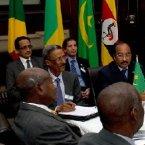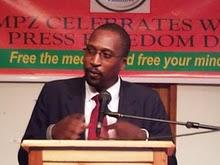The African Union and Libya, on the horns of a dilemma – By Thomas Alberts

Whatever one may think of the AU’s position on Libya, it has been perceived as at odds with the international consensus articulated in the implementation of Resolution 1973 authorising Nato intervention in the country. As the conflict escalated, the AU seemed slow to react. While deliberations in multilateral forums like the UN were rapidly converted into tangible actions directed from Nato’s Brussels headquarters and decisions by the ICC in The Hague, the AU appeared to dither and seemed hesitant or unable to articulate a coherent position.
One explanation favoured at the time by the European and America pundits and commentators suggested African leaders were motivated by a desire to protect an erstwhile friend and mentor. Africa’s reluctant and qualified support for foreign intervention in Libya was explained as misguided historical loyalty at best, and hypocritical at worst, with variations of timidity and naivety characterising the bulk of the response. More empirical explanations have focused on the relative weakness of institutions and mechanisms of the AU. For example, Paul Simon-Handy, writing in The African, argues the AU has no hard power, some soft power, and generally is constrained by a deficit of leadership.
These are all fair points, but I am not convinced they get to the heart of the issue. For one thing, I think substituting the measure of their influence for the measure of their worth undervalues the importance of the different historical trajectories of both the AU’s and the Western powers’ ideas about responding to the Libyan conflict.
Two AU communiqués illustrate the problem. The first, one week before the Security Council vote, specifically rejected “any military intervention, whatever its form”. A week later all three African members of the Security Council (Gabon, Nigeria and South Africa) voted in favour of Resolution 1973 authorising exactly such an intervention, by the north Atlantic alliance no less. Ten weeks later, the second communiqué stressed “the importance of respect of the letter and spirit of resolution 1973″ and was plainly directed at Nato’s expansive interpretation of 1973’s provisions. Clearly the AU was suspicious of France and Britain’s motivations for foreign intervention in Libya, and perceived the enterprise as a project in regime change disguised as humanitarian intervention.
The question I am interested in is how this suspicion can be understood in a way that doesn’t rely on historical loyalties or African anxieties that the Libyan precedent places African states on notice regarding their own domestic conflicts. These familiar explanations miss something important about the historical trajectory of rights discourse that accounts for their saliency and potency in international relations today. Put another way, AU advocacy of a political solution to the escalating conflict and invocations of “the legitimate aspirations of the Libyan people” make more sense when they are read against the grain of the triumphalist account of human rights history underpinning the case for Nato intervention in Libya.
Such a reading requires a historical account, for which Samuel Moyn’s recent revisionist history of the origins and development of human rights is instructive. Moyn argues that human rights are actually a very recent invention. Prior to the 1970s and going right back to the 18th century, the rights that mattered belonged to nations and peoples. They spoke of collective self-determination, not protection of individuals, and were essentially postcolonial in nature; “Human rights simply were the struggle for self-determination”. For Moyn, any attempt “to place anticolonialism in human rights history must face up to an era when the human rights idea had no movement and anticolonialism, a powerful movement, typically took the new “˜human rights’ in the original, collectivist direction of earlier rights talk”.
Moyn argues persuasively that anticolonialism was never a human rights movement, that human rights were stillborn in 1948, and that during the post-war years the Universal Declaration was a sideshow compared with the world reimposition of empire. It would take another two decades before competing imaginaries of collective self-determination would sufficiently decline to open space for individual human rights to take off during the 1970s. One factor was the wane of anticolonialism from the late 1960s (for which the search for the nation-state was only one version, along with communism, pan-Arabism, and pan-Africanism). Another was the Soviet’s crushing of the Prague Spring – namesake of all subsequent reformist movements and uprisings, including the Arab Spring – and the subsequent mobilisation of human rights vocabulary by dissidents seeking a new language with which to articulate their ideas.
In Moyn’s analysis, the aspiration towards a binding international human rights regime became “the last utopia”, simultaneously displacing earlier utopias visualised in a collectivist anticolonial imaginary, and signalling the triumphalist fulfilment of a teleology of human rights thinking that draws a straight line from the revolutions of the 18th century via 1948 to the present.
Although Moyn’s thesis is not without its problems, these do not have a major bearing on the usefulness of his analysis for thinking about the AU’s ambivalence on Libya. I say ambivalence, because the AU’s stance was marked by contradictory impulses, at once rejecting foreign intervention in keeping with an anticolonial emphasis on Libyan self-determination, and at the same time self-conscious that the current distribution of political capital between utopian paradigms does not favour the anticolonial sentiment underlying the AU’s position. The AU’s communiqué of 31 May illustrates some of the tensions. For example, the communiqué states, “The AU’s efforts are driven by the conviction that, ultimately, only a political solution will make it possible to promote, in a sustainable way, the legitimate aspirations of the Libyan people for reform, democracy, good governance, and the rule of law”. In other words, self-determination is the premise of the AU’s efforts and the core of its “conviction”. Later, after re-stating the AU’s support for Resolution 1973, the communiqué states the AU “cannot but echo” the call by the AU’s Peace and Security Council to act in a manner consistent with the resolution’s provisions, “whose objective is solely to ensure the protection of the civilian population”, adding, “This is central for successfully promoting an international consensus on the best way forward in Libya.” The 2-page communiqué mentions human rights only once.
One of the most valuable aspects of Moyn’s thesis is the historical perspective he brings to human rights. Paying attention to historical particularities lays bare the political interests that would obscure contingencies and render the ascendency of the last utopia as natural, inevitable and the culmination of steady progress. In the Libyan case, these interests clearly belong to France and Britain, who together ensured that an ostensibly humanitarian intervention became a regime change operation.
But this historicising perspective is useful in other ways too. The phrase “the last utopia” draws attention to the sense of culmination inherent in the aspiration to international human rights law and is a comment on the teleology of its self-understanding. In this sense, “the last utopia” has something of “the end of history” about it, although in the mode of an acutely reflexive historicising critique designed to disrupt the kind of triumphalism underlining both human rights discourse and Fukuyama’s liberalism. Universal individual human rights obviously is not the last utopia; not only will more utopian paradigms follow, but other utopian imaginaries compete with it in the contemporary world. Among these, the newest challenger today is Islamist thought, and it is revealing that Euro-American concerns about Islamist influence shadow and qualify their every celebration at key developments in Libya (and Tunisia) in recent weeks.
Coming back to the AU, this historicising perspective that renders inevitability and necessity as contingency and interest also has its limitations. Most obviously, the AU’s commitment to an anticolonial version of rights that emphasises collective self-determination ahead of individual human rights is problematic, not only because it can sanction human suffering, but also because it can constrain the kind of self-criticism that would otherwise stimulate a more enabling political environment for alleviating suffering and promoting justice. These are big ideas. They go to the heart of a dilemma that weighs difficult political choices about what is possible against aspirational choices about the kind of world we want to live in, an irresolvable dilemma that underlines the importance of its active engagement. The Libyan example is only the most recent in a list of conflicts around the continent that remind us that postcolonial societies carry a heavier burden than settler ones for negotiating that dilemma.
From South Africa, Thomas Alberts is reading for a doctorate at SOAS and is also a contributing editor for The Majalla – a leading political affairs publication focused on the Arab world.








The Au is correct. Nato overstepped it’s boundaries when it comes to UNSC Resolution 1973 and R2P.